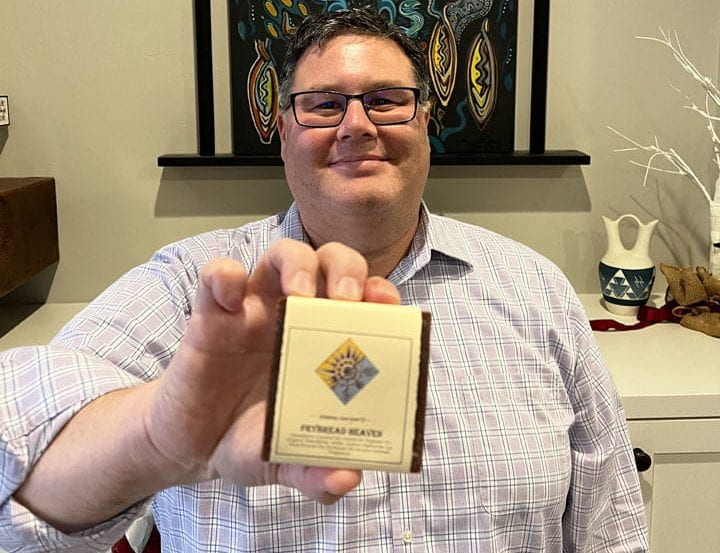When Dennis Zack talks about his experience as a student at UW-Green Bay and his current path as an entrepreneur, he frames it around problems and solutions, diagnoses and prescriptions. He initially struggled in school due to a learning disability, lack of outreach to First Nations students and limited models for what success as an indigenous person can look like. That changed when he transferred to UW-Green Bay. Support from disability services, outreach from the Multicultural Resource Center and seeing students and mentors who looked like him gave him the confidence to thrive. Now, as the founder of Tribal Sun Soap, Zack is providing a solution for the problem of sensitive skin, but he’s also sharing his community’s culture and helping people understand that there is no one mold for what being Native looks like.
Zack is from the small village of Bowler, Wisconsin. He is a member of the Stockbridge-Munsee Band of the Mohican Indians, and he grew up connected to his tribe’s reservation. He remembers not everyone understanding his culture. “I kind of grew up with that whole thing of, ‘oh, you don’t look Indian,’” Zack said. As a child, he didn’t understand where those remarks came from. Looking back, he realized people had a limited understanding. “They’ve only seen Indians badly portrayed on TV from non-Indians in very stereotypical ways,” said Zack.
Zack still struggled with fitting in when he left home to get an education. At the first university he attended, he didn’t feel like he was part of a community. “There was no outreach for Native American students,” Zack said, “I wasn’t really feeling the love there.”
When a friend from his hometown transferred to UW-Green Bay, Zack decided to follow. “That was probably the best decision I made,” he said. Zack felt welcome at UW-Green Bay, something he attributes to the Multicultural Resource Center and outreach from multicultural advisor Bernadine Vigue, who was a fervent advocate for Native students in higher education. Zack got support for his learning disability and felt at home in the multicultural center. His grades went up and he built his confidence. He remembers taking classes with Dr. Lisa Poupart and feeling happy that he had another person in the Native community to look up to.
Zack graduated in 2002 with a degree in Human Development and a minor in American Indian Studies (now First Nations Studies). He went on to get a Social Work master’s degree from Lakeland University. To him, outreach for multicultural students and seeing models of success—along with having the grit to overcome obstacles—were vital to getting his degree. He hopes that the growth of the First Nations Studies program at UW-Green Bay, as well as a greater cultural appreciation for Native people, will do the same for others like him. “We’re in a renaissance right now,” said Zack, “Native people have always been there, but now they’re being highlighted.”
So what does all of this have to do with soap?
For Zack, Tribal Sun Soap is more than just soap. He had the idea for the company after he started developing issues with eczema. He had seen his mom go through the same issue and spend a lot of money on expensive soaps and creams, so he sought out a soap with natural ingredients that would be good for sensitive skin. After some investigating, he realized he could develop and market his own line of soaps with scents that mattered to him. “It went from sharing the soap that worked for me with more natural ingredients to being a platform to share about indigenous culture,” said Zack.

On Tribal Sun Soap’s website, you’ll see scents like Sweetgrass, Powwow Passion, and even Frybread Heaven. Zack commissioned artists from different Indigenous communities to create artwork for each scent, and each tells a story about an element of Native culture. Zack said he looked for threads that tie many cultures together, like the universality of frybread or the common use of sweetgrass as medicine. Each soap is meant to educate people and lift up Native artists and culture. Tribal Sun also gives back to indigenous causes and organizations, like Waking Women’s Healing Institute, Bree’s Closet, and Red Magic.
By celebrating his culture, Zack hopes to give Native people a sense of pride in who they are. That’s something he understands the importance of, and a lesson he stresses for his children; “You should be happy with who you are and be happy in your own skin.”
Tribal Sun Soaps can be found at several gift shops, indigenous-owned businesses, and on their website: https://www.tribalsunsoap.com/


